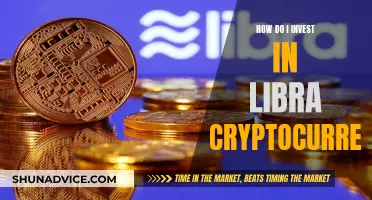
Bitcoin is a household name, but investing in it is a different ball game. Cryptocurrency is a form of virtual money that is secured by blockchain technology. It is important to note that investing in cryptocurrency is risky, and it is not for everyone. The prices of cryptocurrencies, even the most established ones, are much more volatile than the prices of other assets like stocks.
There are several ways to invest in Bitcoin and other cryptocurrencies. Here are some of the most common methods:
- Cryptocurrency exchanges: You can purchase Bitcoin and other cryptocurrencies from exchanges such as Gemini, Kraken, Coinbase, and Crypto.com. These platforms offer a variety of coins and tokens to choose from, and you can fund your account using fiat money.
- Traditional stockbrokers: A few traditional brokers, such as Robinhood, Webull, TradeStation, and Fidelity, offer their customers the ability to buy and sell Bitcoin.
- Bitcoin ATMs: These work like normal ATMs, but you can use them to buy and sell Bitcoin.
- Bitcoin exchange-traded funds (ETFs): The SEC approved spot Bitcoin ETFs in January 2024, allowing investors to gain exposure to Bitcoin through traditional brokerage accounts.
- Peer-to-peer money transfer apps: Cash transfer services like PayPal, Venmo, or Cash App allow users to purchase, store, send, and sell Bitcoin directly through their apps.
- Direct purchase from crypto apps: Some crypto apps, such as games, crypto wallets, or other online services that use blockchain technology, allow users to buy and sell digital assets directly within their app.
When investing in cryptocurrency, it is important to do your research, understand the risks involved, and only invest what you can afford to lose.
| Characteristics | Values |
|---|---|
| Purpose | A form of payment that isn't controlled or distributed by a central bank |
| Creator | A programmer or group of programmers using the name "Satoshi Nakamoto" |
| Value | In 2010, bitcoin traded at less than $0.01. By late 2021, this was above the $40,000 mark. |
| Volatility | Very high |
| Investment risk | High |
| Investment strategies | Buy and 'Hodl', hold long term, trade on short-term volatility |
| Wallets | Hot wallet, cold wallet |
| Exchanges | Coinbase, Binance, Kraken, Gemini, Crypto.com, Robinhood, Webull, TradeStation, Fidelity |
| Payment methods | Bank accounts, debit cards, credit cards, PayPal, Venmo, Cash App |
What You'll Learn

Choosing a crypto-trading service or venue
There are several ways to buy Bitcoin, each offering a different balance of convenience, security and cost. Here are some of the most common ways to buy Bitcoin:
- Cryptocurrency exchanges: Many offer dozens of cryptocurrency choices, while others simply have Bitcoin and a few alternatives. They carry a variety of different fees and consumer protections, so do your due diligence before choosing. Cryptocurrency exchanges where you can purchase bitcoin include Gemini, Kraken, Coinbase and Crypto.com.
- Traditional stockbrokers: The choices among traditional brokers that give customers a way to buy and sell Bitcoin are few right now. Robinhood was the first mainstream investment broker to offer Bitcoin. Other online brokers that offer access to Bitcoin or other cryptocurrencies include Webull, TradeStation and Fidelity.
- Money transfer apps: Cash transfer services like PayPal, Venmo, or Cash App allow their users to purchase Bitcoin using the apps. You can purchase, store, send and sell Bitcoin directly through the apps, which is convenient if you're used to those interfaces.
- Bitcoin ATMs: These work like normal ATMs, only you can use them to buy and sell Bitcoin. They are often placed in locations where you might find normal ATMs, such as convenience stores. Before you carry out a transaction, make sure you look at the fees you'll be charged, and have a plan for where to send the Bitcoin once you buy it.
- Bitcoin exchange-traded funds (ETFs): On 10 January 2024, the Securities and Exchange Commission opened the door for spot Bitcoin ETFs, which track the price of Bitcoin and trade over major exchanges. This was a long-awaited approval from the SEC, and one that is expected to make it even easier for traditional investors to gain access to Bitcoin. The spot Bitcoin ETFs started trading on 11 January 2024, and are available through traditional brokerage accounts.
When creating accounts for your digital wallets and currency exchange, use a strong password and two-factor authentication.
The Rich and Bitcoin: A Lucrative Investment Strategy?
You may want to see also

Connecting your exchange to a payment option
At most exchanges, you can connect your bank account directly or link it to a debit or credit card. Although you can use a credit card to purchase cryptocurrency, cryptocurrency price volatility, combined with a credit card's interest charges, could inflate the overall cost of purchasing a token. Bitcoin is legal in the U.S., but some banks may question or even stop deposits to crypto-related sites or exchanges.
Fees vary for deposits via a bank account, debit, or credit card, and exchanges also charge fees per transaction. It's important to research and compare the fees charged by different exchanges before deciding which one to use.
When creating a cryptocurrency exchange account, it is recommended to use two-factor authentication and a long, unique password that includes a variety of letters, special characters, and numbers.
The Ultimate Guide: Getting Started with Bitcoin
You may want to see also

Placing an order
Once you've decided to invest in Bitcoin, you'll need to choose a cryptocurrency exchange or trading service. These are platforms that allow you to buy and sell Bitcoin and other cryptocurrencies. Examples of popular exchanges include Coinbase, Kraken, Gemini, and Binance. You can also use mainstream brokerage services like Robinhood or Fidelity.
When creating an account on a cryptocurrency exchange, you'll typically need to provide personal identification information and set up a payment method, such as linking your bank account or using a credit or debit card. Some exchanges may also offer alternative payment methods, such as PayPal or Cash App.
After setting up your account and payment method, you can place an order for Bitcoin. The amount of Bitcoin you can purchase will depend on the exchange and your payment method. Some exchanges allow you to purchase fractions of a Bitcoin, so you don't need to buy a full coin.
It's important to carefully consider your investment strategy and risk tolerance before placing an order. Bitcoin and other cryptocurrencies are highly volatile and carry significant risks. Understand the potential risks and rewards before investing any money.
Additionally, be sure to research the fees and consumer protections offered by the exchange or trading service you choose. Compare multiple platforms to find one that suits your needs.
Remember that the value of Bitcoin fluctuates, so the price you pay may vary depending on market conditions when you place your order.
Dragons' Den Bitcoin Code: Did They Invest?
You may want to see also

Safe storage
Bitcoin and cryptocurrency wallets are a place to store digital assets more securely. Keeping crypto outside the exchange and in a personal wallet ensures that investors have control over the private key to the funds. An exchange wallet is offered, but not recommended, for large or long-term cryptocurrency holdings.
There are two types of wallets: hot wallets and cold wallets. Hot wallets are apps on devices such as computers, phones, or tablets. These wallets generate the private keys to your coins on internet-connected devices. The user of a hot wallet is not the holder of the private key to the cryptocurrency held in it. Hot wallets are best for small amounts of cryptocurrency or cryptocurrency that is actively trading on an exchange and may be used like a checking account.
Cold wallets are the safest storage method for your coins. They are not connected to the internet and are, therefore, less likely to be compromised. These offline wallets or hardware wallets store a user's private key on something that isn't connected to the internet and come with software that allows investors to view their portfolio without putting their private key at risk. Cold wallets usually cost between $60 to $100.
A paper wallet is a wallet generated at certain websites that produces both public and private keys printed on paper. Many people laminate these paper wallets and store them in safe deposit boxes at their bank or even in a safe in their home.
A hardware wallet is a USB-drive device that stores a user's private keys securely offline. Hardware wallets have advantages over hot wallets because they are unaffected by viruses that could infect one's computer. With hardware wallets, private keys never come into contact with a network-connected computer or potentially vulnerable software.
Cold wallets require technical knowledge to set up. They can be set up by buying an old, used laptop or phone built by a reputable manufacturer. Then, completely wipe it, do not connect to the internet, and install only an operating system and bitcoin wallet from a USB drive.
Private Key Backup Storage
It is recommended to use seed phrases (possibly with encryption) to store private key backups. Seed phrases written into metal or on paper support deterministic wallets and encryption. As seed phrases use natural language words, they have excellent error correction. If one or two letters are missing or unreadable, the word can often still be deduced. The word list that the seed phrase words are drawn from is carefully chosen so that the first four letters of each word are enough to uniquely identify it.
Security Measures
Hot wallet holders who haven't created enough security run the risk of losing funds to theft. Strong passwords, two-factor authentication, and safe internet browsing should be considered minimum requirements.
Risks of Hot Wallets
If the hot wallet provider is hacked, then your coin information may be at risk.
The Future of Crypto.com Coin: Is It Worth Investing?
You may want to see also

Understanding the risks
Investing in Bitcoin can be risky, so it's important to carefully consider your goals and your strategy before you decide. Here are some of the key risks to be aware of:
Volatility
Bitcoin is known for its volatility, with prices fluctuating dramatically over short periods. This makes it difficult to find the "right time" to buy or sell, and you could end up buying before a price drop or selling before a surge.
Regulatory and Legal Risks
The regulatory landscape for cryptocurrencies is still evolving, and it varies by country. Changes in government policies and crackdowns can impact the value of Bitcoin. Additionally, while cryptocurrencies are legal in the US, they are not considered legal tender and are subject to different tax rules than traditional currencies.
Security Risks
Bitcoin wallets and exchanges are attractive targets for hackers. It's important to take precautions such as using strong passwords, two-factor authentication, and secure internet connections to protect your Bitcoin holdings.
Limited Investor Protections
Bitcoin and cryptocurrency investments are not insured by the Securities Investor Protection Corporation (SIPC) like traditional stock brokerage accounts. While some exchanges provide private insurance, this doesn't protect against individual online breaches such as password theft.
Environmental Impact
Bitcoin mining, the process of verifying transactions on the blockchain, consumes a significant amount of energy and has a large environmental impact. This has led to increased scrutiny and could impact the future of Bitcoin.
Fraud and Scams
The decentralized nature of Bitcoin and the anonymity it offers make it a target for fraudsters and scammers. It's important to carefully research any investment opportunities and be cautious of potential scams.
High-Risk Investment Strategy
As a relatively new and untested asset class, investing in Bitcoin is considered high-risk. There is no guarantee that it will reach the potential anticipated by some proponents. It should only be a small part of a diversified investment portfolio.
Calculating Your Bitcoin Investment's Average: A Simple Guide
You may want to see also
Frequently asked questions
You can purchase bitcoin from a cryptocurrency exchange, such as Gemini, Kraken, Coinbase, or Crypto.com. You will need a cryptocurrency exchange account, personal identification documents, a secure internet connection, a payment method, and a digital wallet outside the exchange account.
Bitcoin is a very high-risk investment because it's a volatile asset. That means that Bitcoin values may rise or fall dramatically in value over a very short period—even as quickly as a few hours or days.
The main benefit to Bitcoin investing is that you may be able to generate a huge return on profit, perhaps as high as 200% or more.
Bitcoin can be stored in two kinds of digital wallets: a hot wallet or a cold wallet. With a hot wallet, transactions are generally faster, while a cold wallet often incorporates extra security steps that help to keep your assets safe but also make transactions take longer.







